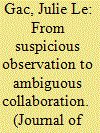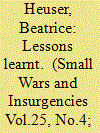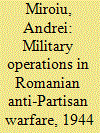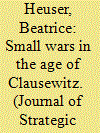|
|
|
Sort Order |
|
|
|
Items / Page
|
|
|
|
|
|
|
| Srl | Item |
| 1 |
ID:
164199


|
|
|
|
|
| Summary/Abstract |
Where does British open source intelligence (OSINT) fit into the intelligence debate surrounding Allied knowledge of the Holocaust? In particular what can this source of intelligence tell us in regards to the opening of the extermination phase of the Holocaust in the Soviet Union? Were the Allies conclusions being falsely influenced by their own OSINT analysts? Or conversely did OSINT provide further evidence (alongside SIGINT decodes) that the Nazis were now committing mass genocide. This article explores these questions by examining the FRPS/FORD OSINT reports from the civilian ruled territories of (and those intended for) the Reichskommissariate Ostland and Ukraine.
|
|
|
|
|
|
|
|
|
|
|
|
|
|
|
|
| 2 |
ID:
083482


|
|
|
|
|
| Publication |
2008.
|
| Summary/Abstract |
During the first months of the Italian Campaign, partisans' activity was isolated and spasmodic, and Allied support was minimal. In fact, it took the Allies nine months to consider the Italian partisans not so much as a threat as a potential opportunity. This article seeks to explain the Allies' attitude toward the Italian partisans. Relations among the Allies, the Italian government and the partisans involved a combination of military and political problems. The Allies' weak support for Italian partisans was in fact the by-product of an overall strategic plan in which means were limited and priorities had naturally to be established in a context of world war. It also revealed their fears: the common suspicion toward irregular fighters, the growing fear of communists and the fear of possible Italian post-war demands
|
|
|
|
|
|
|
|
|
|
|
|
|
|
|
|
| 3 |
ID:
133518


|
|
|
|
|
| Publication |
2014.
|
| Summary/Abstract |
Did participants in small wars in the period 1775-1831 learn from previous or contemporary examples? While this is difficult to prove for participants who left no written records, there is considerable evidence in existing publications by practitioners that they did indeed draw out lessons from recent insurgencies, either from their own experience or from events elsewhere which they studied from afar, especially the Spanish Guerrilla, which had already become legendary. Most authors showed an interest in how to stage insurgencies rather than in how to quell them. Even then, transfer did not come in a package of tactics-cum-values, but in each case in different configurations.
|
|
|
|
|
|
|
|
|
|
|
|
|
|
|
|
| 4 |
ID:
132217


|
|
|
|
|
| Publication |
2014.
|
| Summary/Abstract |
Romanian anti-communist armed resistance has received relatively little attention outside the country, despite its resemblance to other small, diffused, headless insurgencies being fought in the first decades of the twenty-first century. This article deals with military operations mounted against the partisans, with a special focus on tactics such as cordoning, checkpoints, patrols, sweeps, ambushes, and informed strikes. Based mostly on primary sources, it highlights success and failure against determined and elusive guerrillas.
|
|
|
|
|
|
|
|
|
|
|
|
|
|
|
|
| 5 |
ID:
083479


|
|
|
|
|
| Publication |
2008.
|
| Summary/Abstract |
This introductory article begins by sketching the general historical background of partisan and anti-partisan warfare in German-occupied Europe. It then briefly outlines the state of available primary sources, and the often heated, controversial character of the historiographical debates which are taking place within this area. It then considers, at some length, the lessons which the five articles presented, offer for the present-day conduct of counter-insurgency warfare - lessons relating to the effects of higher-level strategic perceptions; to the potential, then as now, for directing a policy of 'disaggregation' against insurgents; to the importance of situating counter-insurgency warfare within the context of wider policies which are receptive to the needs of the occupied population and its social and cultural characteristics; and to the necessity of fielding counter-insurgency forces which not only are well-resourced, but which also, in stark contrast to the anti-partisan formations which the Germans so often deployed, conduct themselves in ways that cultivate the population rather than alienate it.
|
|
|
|
|
|
|
|
|
|
|
|
|
|
|
|
| 6 |
ID:
093806


|
|
|
|
|
| Publication |
2010.
|
| Summary/Abstract |
Around the time of Clausewitz's writing, a new element was introduced into partisan warfare: ideology. Previously, under the ancien rgime, partisans were what today we would call special forces, light infantry or cavalry, almost always mercenaries, carrying out special operations, while the main action in war took place between regular armies. Clausewitz lectured his students on such 'small wars'. In the American War of Independence and the resistance against Napoleon and his allies, operations carried out by such partisans merged with counter-revolutionary, nationalist insurgencies, but these Clausewitz analysed in a distinct category, 'people's war'. Small wars, people's war, etc. should thus not be thought of as monopoly of either the political Right or the Left.
|
|
|
|
|
|
|
|
|
|
|
|
|
|
|
|
| 7 |
ID:
026928


|
|
|
|
|
| Edition |
1st ed.
|
| Publication |
New Delhi, Allied Publishers Private Limited, 1984.
|
| Description |
xxii, 208p.hbk
|
|
|
|
|
|
|
|
|
|
|
|
Copies: C:1/I:0,R:0,Q:0
Circulation
| Accession# | Call# | Current Location | Status | Policy | Location |
| 024985 | 954.9204/GAR 024985 | Main | On Shelf | General | |
|
|
|
|
|
|
|
|
|